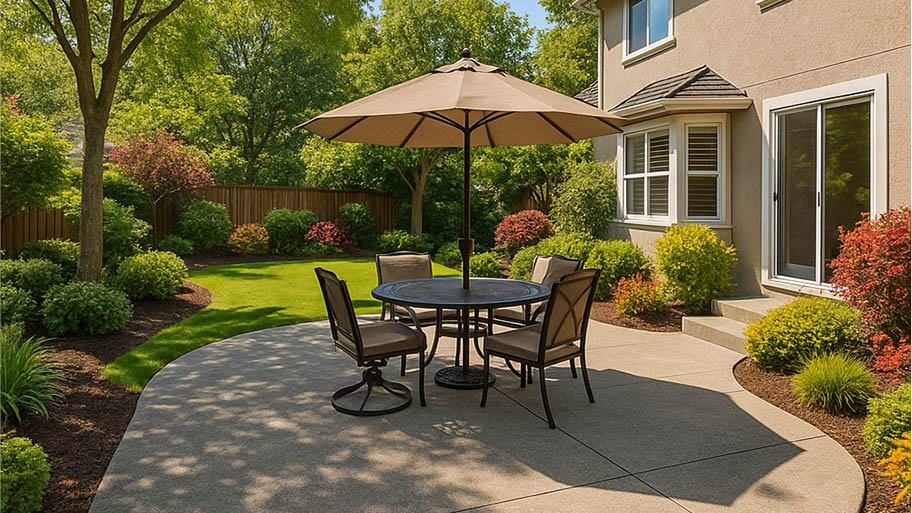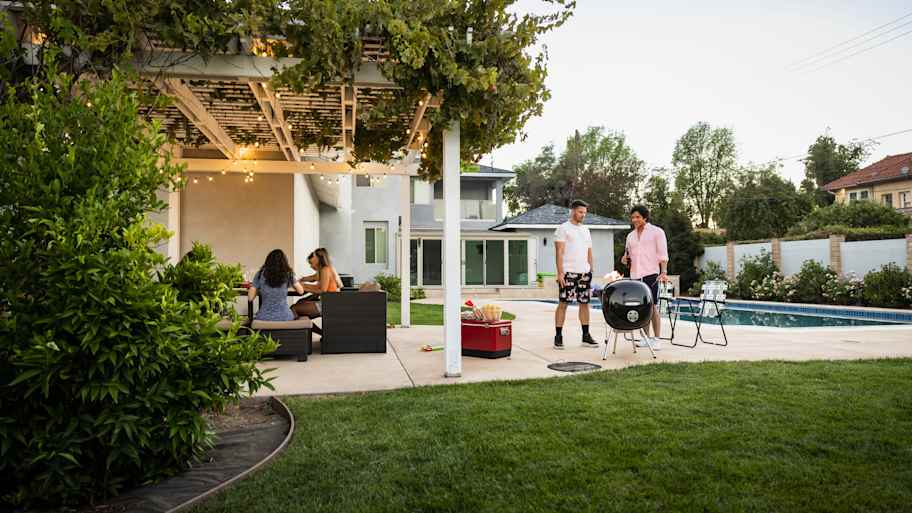
Learn the cost of a metal awning for your home. Discover the essentials of installation, materials, and labor, and explore ways to save on your project.
Fix eyesores and damage fast with these solutions
Concrete is porous, making it prone to damage.
Weather, wear and tear, and poor installation are common culprits.
Fixing issues quickly will extend the life of your patio.
Professionals are the best option for repairing structural issues.
Concrete patios are a durable choice for outdoor living, but they’re not problem-free. Weather, wear and tear, and even small installation mistakes can lead to concrete patio problems that affect both appearance and safety. Left untreated, these issues often get worse. Here’s how to spot and fix the most common ones so you can keep enjoying your outdoor space.
Cracks are one of the most common and concerning concrete patio problems for homeowners. Concrete will expand and contract with temperature and moisture changes. Over time, this movement, combined with shifting soil or poor installation, can cause visible cracks.
Hairline cracks are often cosmetic, but more profound or widening ones may signal issues like settling, drainage problems, or freeze-thaw damage. If ignored, they can grow, letting in water that freezes and expands in colder climates, leading to more serious damage.
Fixing patio cracks depends on their size and severity. Hairline cracks under 1/8 inch are typically surface-level; you can fill them with a flexible crack filler. Clean the area thoroughly, apply the filler, smooth it out, and let it cure as directed.
You can also fill medium cracks up to 1/4 inch, but monitor them over time. If they grow, it may signal underlying soil movement. In this instance, consult a pro to rule out structural issues.
Large or shifting cracks often indicate a foundation issue that DIY fixes won’t resolve. Working with a local deck repair specialist will help you assess whether the patio needs slab stabilization or replacement. If the latter is the case, you can expect your cost for a concrete patio to range from $1,915 to $5,350.

Here is the deal: concrete is porous and prone to discoloration. Even the most well-built concrete patio can look like a wreck if stains are left to set. Grease from grilling, rust from metal furniture, and tannins from fallen leaves are some of the most common culprits. Worse, stains like these can be nearly impossible to remove if left unaddressed.
To restore your patio's appearance, match your cleaning method to the type of stain. Remember, regular maintenance, like sweeping leaves and cleaning up spills right away, will help prevent tough stains from forming in the first place.
Mix oxygenated non-chlorine bleach with water for organic stains from leaves and dirt, and scrub the area with a stiff brush. Let the solution sit for up to 15 minutes and rinse thoroughly. Repeat if necessary.
If your concrete patio has grease or oil stains, apply a degreasing agent. Scrub vigorously, let it sit for 10 to 15 minutes, then rinse. For older stains, a pressure washer may help.
For rust stains on patios from metal furniture or tools, you should reach for a concrete-safe rust remover and follow the manufacturer's instructions.
This type of surface damage results from freeze-thaw cycles, where water freezes and expands inside the concrete. Poor installation or winter de-icing salts can speed up erosion.
The proper fix depends on how deep the damage goes. For light flaking, apply a concrete skim coat. Clean the surface, remove loose material, then spread the product with a squeegee or trowel per the manufacturer’s instructions. You can also opt to
If the flaking is extensive and the original surface is crumbling away in large areas, the best solution is to resurface the concrete patio. This process involves grinding the top layer and applying a new concrete overlay layer for a more permanent fix. It's more labor-intensive but can extend the life of the patio by many years.
Remember, if spalling has exposed the aggregate beneath the surface or, worse, the steel rebar, the damage is mainly structural. In that case, it's essential to call a professional contractor. Exposed rebar can rust and expand, leading to further cracking and instability.

If water regularly collects on your patio, it can lead to faster wear, promote mold growth, and even cause structural issues like uneven or sunken slabs.
Usually, calling a decking professional to assess the situation is best. If poor drainage contributes to warping, they may recommend adjusting the slope by grinding down high spots or re-pouring sections of the base to ensure water runs off properly.
They might also suggest adding drainage solutions like a French drain, channel drain, or dry well near the deck to help redirect water away from the structure and prevent future moisture damage.
Before you can fix a concrete patio, you need to know what to look for. Spotting these early signs can help you take action before the damage worsens.
Cracks of any size, whether hairline or wider, can let in moisture and damage concrete over time.
Discoloration or staining from rust, grease, and leaf tannins can leave unsightly marks that become harder if ignored.
Chipping or flaking, known as spalling, is often a sign of freeze-thaw damage or poor finishing.
Exposed aggregate or rebar indicates more serious deterioration, requiring professional help.
While homeowners can tackle minor concrete patio problems, significant issues are best left to professionals, especially when they involve structural concerns or widespread damage.
Call a professional if:
Cracks are over 1/4 inch wide or appear to be growing.
Concrete slabs sink, lift, or feel unstable underfoot.
Spalling has exposed aggregate or rebar, indicating deeper structural damage.
Drainage problems persist despite surface fixes.
You are unsure about the cause of the damage or how to repair it safely.
From average costs to expert advice, get all the answers you need to get your job done.

Learn the cost of a metal awning for your home. Discover the essentials of installation, materials, and labor, and explore ways to save on your project.

A concrete patio adds valuable outdoor living space to your home. Learn how much a concrete patio costs and which factors affect the project price.

Looking to build an outdoor entertainment space? Use this patio cost guide to get an idea of how much your exterior project will come out to.

Installing a new wooden deck? Explore this guide to learn about the best wood for decks, including the benefits, costs, and life expectancy of each type.

There are many different types of patios out there, each with their own benefits and drawbacks. Here are the major patio types to choose from.

Learn the cost of a metal awning for your home. Discover the essentials of installation, materials, and labor, and explore ways to save on your project.